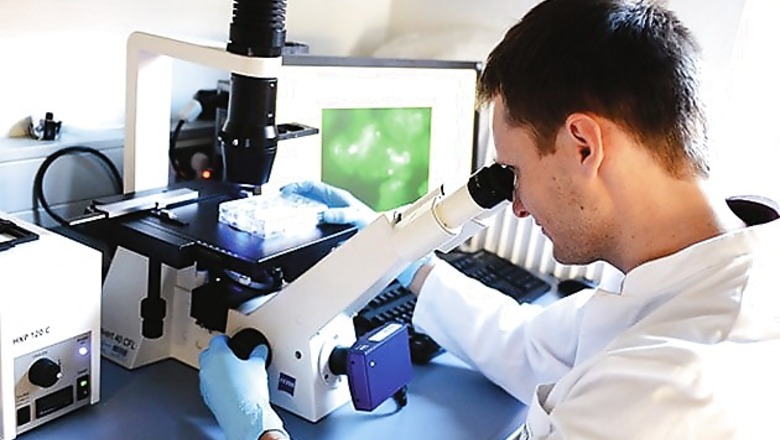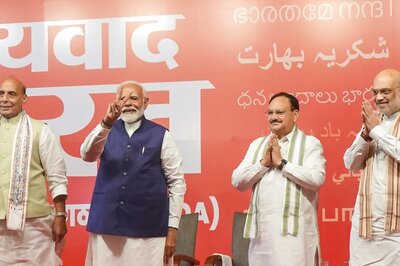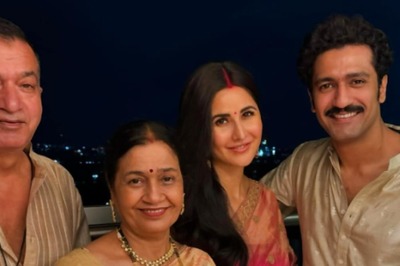
views
Geneva/London: Trials of Ebola vaccines could begin in West Africa in December, a month earlier than expected, and hundreds of thousands of doses should be available for use by the middle of next year, the World Health Organization said on Friday.
Vaccines are being developed and made ready in record time by drugmakers working with regulators, the UN health agency said, but questions remain about their safety and efficacy which can only be settled by full clinical trials.
"Vaccine is not a magic bullet, but when ready they may be a good part of the effort to turn the tide against the epidemic," senior WHO official Marie-Paule Kieny told a news briefing after a meeting in Geneva of industry executives, global health experts, drug regulators and funders.
"We are talking now about starting in December and not January. So this shows again how everything is really pushed forward and the massive effort which is undertaken by everybody to make this happen."
While financing was discussed, there were no details of specific funding pledges for Ebola vaccines' development, distribution and deployment.
"There is a broad understanding that money will not be an issue," said Kieny, the WHO's assistant director general for health systems and innovation. "And on commitment of vaccine manufacturers, of course there is commitment for affordable prices."
Kieny said the World Bank would help to put together a fund to indemnify companies in case people had adverse reactions to the new Ebola shots, with financing from development agencies. Britain had suggested setting up the fund and others had shown they were also in favour of contributing, she said.
Two leading vaccine candidates from GlaxoSmithKline and NewLink Genetics are already in human clinical trials, and another five experimental vaccines would begin clinical trials in the first quarter of next year. One from Johnson & Johnson will start trials in January.
Experts aim to conduct a range of different clinical trials in Liberia, Sierra Leone and Guinea to produce the first efficacy data by around April, she said. Plans are most advanced for Liberia, where 20,000-30,000 volunteers would receive one of two Ebola vaccines or a placebo -- likely a vaccine for hepatitis, influenza or rabies.
At least 4,877 people have died in the world's worst recorded outbreak of Ebola, and at least 9,936 cases of the disease had been recorded as of Oct. 19, the WHO said on Wednesday, but the true toll may be three times as much.
FINANCIAL BACKING
Mali on Thursday became the sixth West African country to have a confirmed Ebola case in the worst outbreak on record of the haemorrhagic fever.
If data from accelerated safety trials in human volunteers suggests they are safe to use, the plan is that several thousand doses will be given to high risk groups such as frontline health workers in Guinea, Sierra Leone and Liberia by early next year.
"The message we heard from WHO that the people fighting the epidemic will be among the first to test Ebola vaccines and treatments is exactly the one we needed to hear," said Bertrand Draguez, medical director for international medical charity Medecins Sans Frontieres (Doctors Without Borders).
"Today, doctors and nurses involved in the struggle against Ebola are getting more and more frustrated as they have no treatment for patients with a disease that kills up to 80 percent of them."
MSF and some of the WHO's donor countries have pledged to finance vaccines, Kieny said, and the World Bank and GAVI, which funds vaccines for developing countries, were also interested. A GAVI board meeting is set for December on the issue, she said.
A mass immunisation programme would not happen until much later, when vaccine production has been ramped up.
A key unknown is how much vaccine each individual will need to get protection. If all goes well, and dosing per person is moderate, drugmakers hope to produce millions of vaccines shots by the end of 2015, reflecting an expected steep ramp-up in production during the year.
Despite the sense of urgency, one person involved in this week's discussions in Geneva said coordinating all the parties in the process was not easy and there was still considerable debate about how clinical trials should be designed and the standard of evidence needed for regulatory approval.



















Comments
0 comment